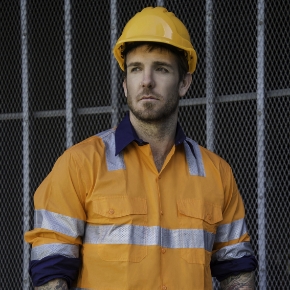 MPRV: skilling the next generation through safety cadetships
MPRV: skilling the next generation through safety cadetships
Major Road Projects Victoria recently won the Best WHS Learning & Professional Development Program in the Australian Workplace Health & Safety Awards for its civil construction safety cadetship program
The Major Road Projects Victoria (MRPV) Civil Construction safety cadetship program is a paid employment and training program within the Victorian Government’s Major Transport Infrastructure Authority (MTIA). Delivered by numerous leading global construction companies, the safety cadetship program is an accelerated, non-traditional, entry-level pathway to becoming a safety practitioner.
The business need
The demand for safety professionals is far outweighing the supply in the employment market – currently up 180 per cent compared to this time last year, as specified in the Safe Step National HSE Job Opportunities Index (May 2022). The market can’t keep up with demand, resulting in a continuous shift of talent shortage from one civil construction organisation to another.
“The civil construction industry is currently facing a severe shortage of appropriately qualified and experienced safety professionals. It is clear there is a need to grow the already struggling resource pool to keep up with the demand for future infrastructure works.” To add to this challenge, Infrastructure Australia said it expects that 40 per cent of the workforce will retire in the next 15 years, leading to a loss of technical knowledge and construction experience.
Sarah Krausas, safety systems and innovation manager at MRPV, identified two clear challenges to be addressed when designing the Civil Construction safety cadetship program: the need to attract new applicants and the necessity of retaining the knowledge of existing safety professionals. “Existing pathways are not keeping up with industry demand both from a headcount point of view as well as an experience and capability perspective. Currently, employers are lacking the resources and expertise to achieve such a thorough and tailored recruitment process to attract the right talent to fill safety positions,” Krausas said.
Developing the civil construction safety cadetship program
In the process of developing the civil construction safety cadetship program, MRPV identified six key challenge areas that significantly affect safety performance in the civil construction industry. These include poor execution and lack of experience in operational safety risk management, safety and risk leadership, subcontractor management, managing incident investigations, and effective communication and consultation.
MRPV also identified that the current Certificate IV and Diploma in Work Health and Safety do not provide a detailed level of understanding of these challenges and how they relate to the civil construction industry. “It is also recognised that tertiary OHS courses have continued to diminish in Victoria over recent years; that has in the past provided additional insights in these challenge areas,” according to Krausas.
In addition to this, she said safety professionals often work in isolation, which results in knowledge and experience being lost when people depart businesses. “This stressed the need for a formal program to be designed that includes an element of mentoring to ensure knowledge is retained and transferred, so we can build depth in our resources to enable lucrative succession planning,” she said. Mathew Dicker, safety and wellbeing director at MRPV, reiterated that “the industry’s dry pool of appropriate job seekers and lack of formal knowledge transfer programs forces civil infrastructure employers to promote or place under-skilled people into senior roles beyond their capabilities. This leaves businesses vulnerable and risks the health and safety of their workforce teams and the broader community.”
About the program
The Civil Construction safety cadetship program provides an accelerated, non-traditional, entry-level pathway for new entrants to develop a career as a safety professional. The cadetship is a paid two-year fixed-term training program partnered with meaningful employment at some leading Australian and global construction companies. There are three key elements of the cadetship program: vocational education, paid on-the-job experience and MRPV-specific training and support.
“The value this program brings to the construction industry is recognised broadly across all MRPV delivery partners and throughout all levels of leadership,” said Dicker. The program had phenomenal support from the road program’s executive leadership team. All cadets enrolled in the program were afforded the opportunity to meet with these executive leaders, providing visible support and drive for this program.
MRPV partnered with Hoban to facilitate a tailored, inclusive, and comprehensive recruitment process enabling MRPV to attract and identify individuals that possessed the right aptitude and attitude to excel in the Civil Construction safety cadetship program and build a meaningful career as a safety professional. After successfully participating in a rigorous recruitment process designed by an organisational psychologist delivered at Hoban’s assessment centres, 19 cadets were onboarded from a shortlist of over 260 applications.
MRPV also collaborated with registered training organisation, Safety Dimensions, to ensure the Cert IV and Diploma in Work Health and Safety were delivered in a meaningful way by nominating industry-specific electives and contextualising the content to the Victorian civil construction industry.
To complement the formal learning, Krausas said every cadet was nominated an experienced and qualified supervising safety professional to oversee their day-to-day activities. “The cadetship learning guide provides a framework for supervisors to progressively expose cadets to all areas of safety. The guide provides a roadmap to appropriate learning opportunities across a wide range of safety-related topics and challenges. It encourages and empowers the cadet to broaden their experience into all facets of the safety profession throughout their time spent in the program,” she said.
“The average day for cadets will never be the same and over time may include tasks such as reviewing construction methodologies, testing site emergency preparedness, inducting new items of mobile plant that are brought to the site, leading regular site inspections to monitor implementation of the company’s safety controls, and assisting in formal auditing of the safety management system.”
Impact and outcomes
The program delivered a number of successful outcomes including high participant engagement in the program, strong engagement from industry partner contractors and major projects operating in Victoria, as well as a desire to roll out the next round of the Civil Construction safety cadetship program more broadly to other industry partners. “The direct outcomes and benefits of the program include the candidates’ readiness for safety roles, alignment of the program to MRPV’s safety culture, a focus on improving safety performance, building capability within our industry partners by providing them with suitable and valuable resources, and affording cadets the opportunity to progress beyond a Diploma to higher studies to meet business requirements,” said Dicker.
The feedback received from participants upon completion of their program induction was overwhelmingly positive, and Krausas said more than 80 per cent of participants found the induction program ‘very’ or ‘extremely’ interesting while 85 per cent found the session ‘very’ or ‘extremely’ helpful in providing context and understanding of their newfound career, and 95 per cent of attendees found the overall satisfaction with the course 80-100 per cent satisfactory. “The primary theme in participants’ feedback was how the induction week strengthened relationships within the cadetship cohort through their shared participation in the induction activities,” she said.
The program partnered with employers from 10 leading contractors and Victorian civil infrastructure projects, including Bild Group, BMD Constructions, Laing O’Rourke, Major Road Projects Victoria, McConnell Dowell, North East Link Project, SPARK-NEL, Symal, Whelans Group, and Winslow Infrastructure Group. “All the partnered contractors and major projects have expressed interest in the program running again, triggering the need for an early rollout of the next cadetship program,” said Dicker.
Originally published by Australian Institute of Health & Safety (AIHS) 10.2023












































































